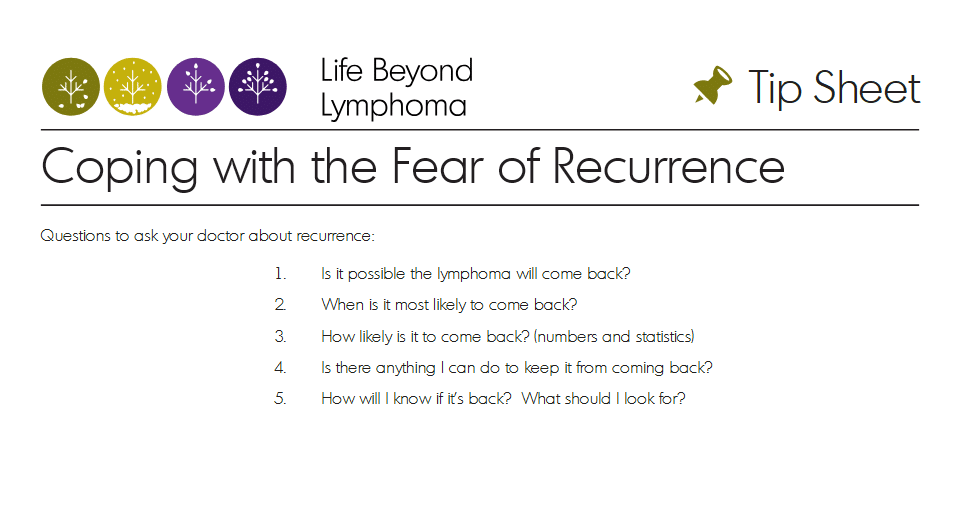Lucie B. discusses how acceptance is helping her cope with the fear of recurrence.
The fear of recurrence may begin during treatment and last well into remission. Fear of recurrence might include the fear of having to repeat treatment, losing control of your life, or facing death. You may wonder “Why me?”. Your fears are normal, they are controllable, and they will diminish in time. Lymphoma is highly treatable in many forms and new innovative treatments extend remissions. While you cannot control whether your lymphoma recurs, you can control how much you let the fear of recurrence impact your life. Once you’ve collected all the medical facts you can begin to formulate your own method of coping.
Tips for Coping
Recognize and accept your fears: It may help to know that for many people, the fear of recurrence usually lessens over time. Be assured that you won’t always feel so fearful but recognize that your fears may temporarily increase at times such as before follow-up care appointments, around the anniversary date of your diagnosis, or if someone close to you is diagnosed with cancer. Accept that you are going to experience some fear and focus on finding ways to help yourself cope. Do not criticize yourself for being afraid.
Journal: One way to reduce your anxiety is to write down your thoughts in a journal. Thinking about your concerns can help you explore the issues underlying your fear. The LBL Guide has a lot of thought provoking questions that help you identify your feelings and emotions at this stage of your lymphoma experience.
Don’t worry alone: Many people find that joining a support group, either in person or online can be helpful. Support groups offer the chance to share feelings and fears with others who understand and who have been through a similar experience.
There are some individuals who aren’t ready to share in a group setting and may find it helpful to find one person who they trust to confide in.
Talk to a counselor: If family and friends are not able to help you with your concerns, your healthcare team or an accredited counselor may be an important source of support. Ask for a referral to a counselor who works with other cancer survivors.
Create a follow-up care plan: After finishing treatment, create a record of your treatment and a plan for your follow-up care. It may help you feel more in control if you see yourself and your healthcare team as partners in charge of decisions related to your health.
Be well informed: Although your doctor cannot tell you exactly what will happen to you, members of your healthcare team will be able to give you specific information about the statistics about your type of lymphoma and the likelihood that it might come back as well as what symptoms to look for. Knowing what to expect can help you stop worrying. Here are some questions you can ask your doctor if you are fearful of recurrence:
- Is it possible the lymphoma will come back?
- When is it most likely to come back?
- How likely is it to come back? (numbers and statistics)
- Is there anything I can do to keep it from coming back?
- How will I know if it’s back? What should I look for?
Adopt a healthy lifestyle: While no one can say what causes lymphoma to come back, avoiding unhealthy habits, like smoking and excessive drinking, can help to reduce the risk of recurrence. Eating a well-balanced diet, exercising regularly, and getting enough sleep helps you feel better physically and emotionally and will also decrease your chances of developing other health problems.
Find ways to relax and reduce stress: Experiment with different ways to reduce stress and anxiety. Some approaches to consider are:
- Spend time with family and friends
- Participate in hobbies and other activities you enjoy
- Take a walk and exercise regularly
- Avoid unnecessary stress and responsibilities
- Only commit yourself to tasks you have time for
- Embrace your belief system
- Try various meditation or relaxation techniques
- Join a support group
- Let yourself laugh
- Simplify your life
Dr. Sophie Lebel discusses Fear of Recurrence for lymphoma patients and management.






